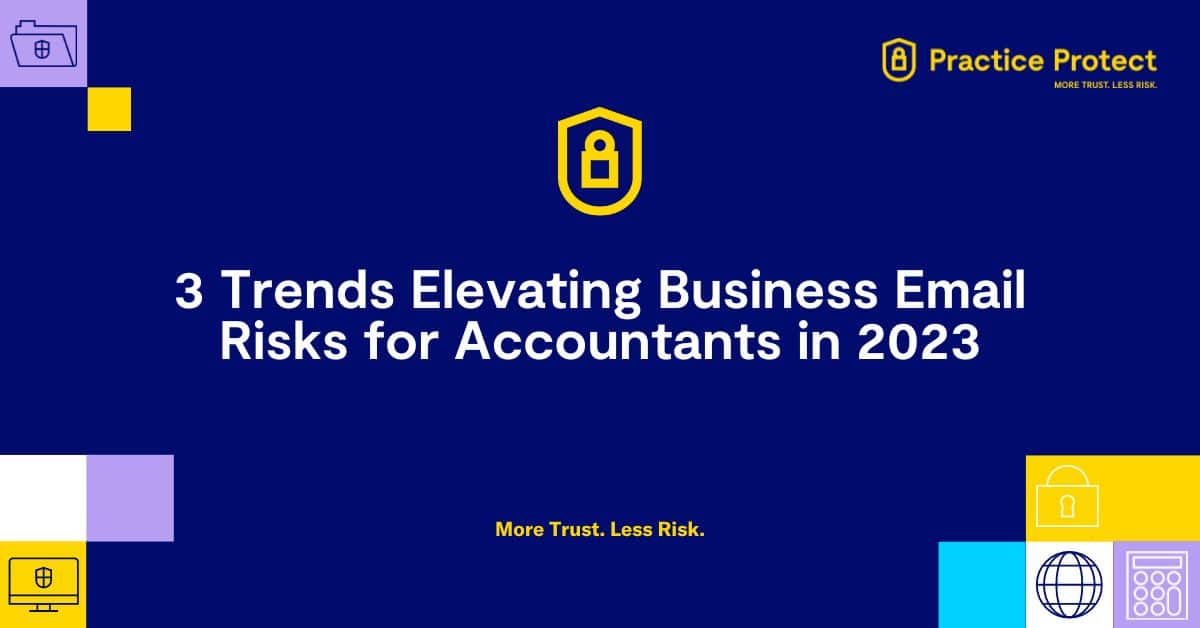3 Trends Elevating Business Email Risks for Accountants in 2023

Security discussions have undergone a transformation to counter evolving cybercriminal tactics. Initially, focus centered on safeguarding client data to prevent financial and reputational harm. This resulted in investments in single sign-on (SSO), multi-factor authentication (MFA), and a shift to cloud-based software with robust online security. With improved data protection, hackers shifted their attention to exploiting vulnerabilities within the communication medium itself – Email.
Consider this: controlling someone’s email account equates to possessing their identity. In essence, email gives hackers access to relationships, applications, and data – a digital key to their kingdom.
Let’s delve into the 3 trends that have significantly elevated the business email risks for accountants in 2023
1. Surge in Email Activity Since the Pandemic
The pandemic forced many accountants to increase their email activity. This is a reflection of the changing ways in which businesses are communicating and collaborating.
Practice management tools are pivoting to help accountants manage the increased volume of email. For example, newer practice management platforms such as FYI encourage accountants to view and check off tasks from within Outlook. Another software, Karbon, has also taken an email-centric approach with a triage centre that quickly turns emails into actionable tasks.
The rising dependency on email makes it a highly attractive target for hackers. This is the first line of communication where accountants make decisions quickly and respond to client requests.
The increasing volume of emails makes it much harder for time-poor accountants to keep up with requests from clients and colleagues. A well-written email, crafted to look like one of the many legitimate messages, can easily blend in with the torrent.
2. Targeted Phishing Takes Center Stage
Email compromise techniques have taken a sophisticated turn. Hackers no longer rely on a spray and pray approach. They now employ targeted phishing tactics, aiming at industries with sensitive information and trusted payment partners.
Accounting firms often become targets of spear-phishing attacks, where hackers focus on the leadership within organizations. Executives have better access to valuable financial data and are more susceptible to attacks due to a lack of proper training.
According to Lookout, the highest rate of mobile phishing attacks in history was recorded in 2022.
3. AI Elevates Impersonation Attacks
AI-powered tools have exponentially increased the sophistication of impersonation attacks. In fact, a recent study revealed that 67% of email based cyber attacks now leverage AI technology, making them more difficult to detect and defend against.
We usually associate a spam email with bad sentence structures and grammatical errors, but with tools like ChatGPT, language is no longer a barrier for hackers from non-english speaking countries.
Replicating communication styles of executive teams and trusted partners can be effectively done using AI tools. This is resulting in unprecedented rise of high targeted impersonation attacks that get impossible to detect
How to secure your business emails?
Effective defense relies on three pillars: the right technology, a well-educated team, and comprehensive policies. Ensuring robust email access and application security, training your team to recognize threats, and implementing sound policies are the key components to safeguarding your business from the evolving dangers of cybercrime. Learn more about this in our recent blog – Safeguarding Your Business Emails: The 3 Pillars of Cybersecurity
In the rapidly evolving landscape of cybersecurity, staying ahead of these trends is imperative for accountants. Recognizing the amplification of email-based risks and fortifying your defense mechanisms against them are essential steps to safeguarding your firm’s integrity and data. By comprehending these trends, you equip yourself to navigate the intricate web of cyber threats in 2023 and beyond.

